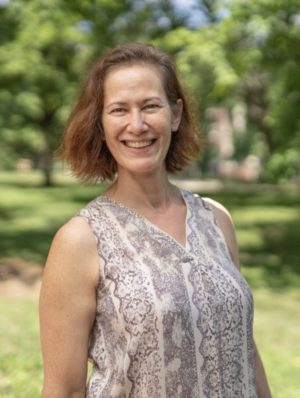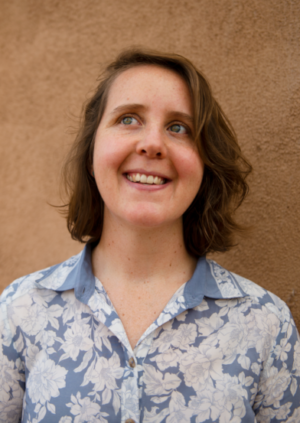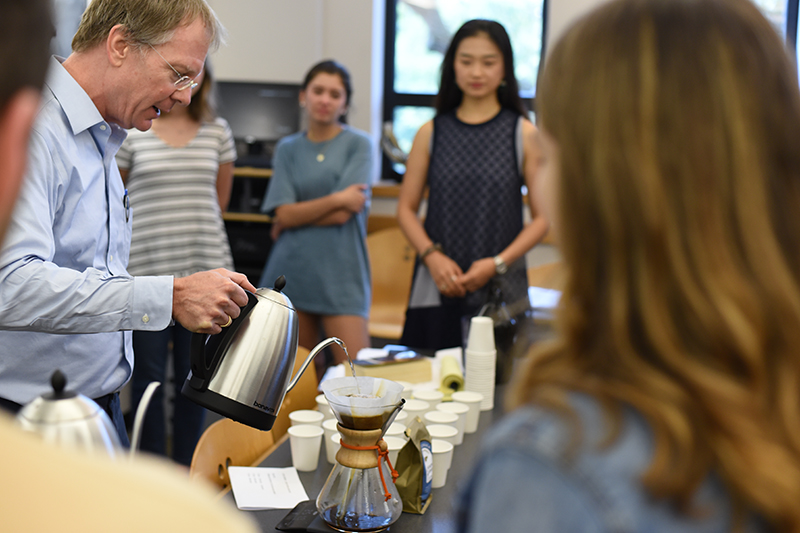Robert Penn Warren Center for the Humanities, The Wond’ry collaborate on undergraduate coffee studies program
Americans love coffee: according to Statista, two-thirds of us drink at least two cups per day. Many people, however, are unaware that the popular drink has a complicated past—and present. Together with The Wond’ry, the College of Arts and Science’s Robert Penn Warren Center for the Humanities aims to close that knowledge gap. Beginning this fall, the two centers will offer the co-curricular program The Scholarship of Everyday Life & The Coffee Equity Lab. The new initiative will educate undergraduate students about the sociocultural, economic, environmental, and political circumstances that shape the global coffee supply chain.

The idea for the program first emerged as Elizabeth Meadows, the Robert Penn Warren Center’s associate director and a senior lecturer in English, sought ways to encourage undergraduate student engagement at the center. She formed an undergraduate student advisory council, which quickly told her that undergraduates’ interests differed from the working groups and seminars the center typically offered for faculty and graduate students. Instead, undergraduates wanted to study topics with real-world impact and to complete hands-on projects.
Meadows credits Hunter Long ’21 with suggesting coffee as a topic. He pointed out that coffee is a uniquely interdisciplinary subject, with ties to African and Latin American history, the history of the Enlightenment, and climate change. The topic also fits with the Robert Penn Warren Center’s 2020-21 theme, “Imagining Cities,” because specialty coffee shops often function as early outposts and signifiers of urban gentrification. And the College of Arts and Science is home to one of the world’s leading coffee experts: Ted Fischer, a professor of anthropology and director of the Center for Latin American Studies. “Hunter just did such a good job of convincing me,” Meadows said.

When Meadows approached Fischer with the idea, he connected her with Hanes Motsinger, The Wond’ry’s social innovation program coordinator. Motsinger completed a master’s thesis on the coffee sector and recently opened the Coffee Equity Lab, which provides ways for students to examine equity and social justice issues through the lens of the global coffee industry.
“Coffee is a topic where you can really dig into the work of social justice and environmental responsibility. Students will be able to ask hard questions and really engage in critical and analytical thinking, but at the same time they’ll have the opportunity to learn how to make a difference,” Motsinger said.
The program’s first year will look somewhat different than Meadows and Motsinger had originally planned, due to the pandemic, but will still include a number of engaging activities. Participating students, who had to apply for admission to the program, will attend three online events that are also open to the public. Ted Fischer led the inaugural event on September 17 with a talk on Maya coffee farming and the cultural contexts of coffee pricing. Upcoming events include a discussion with two Black women coffee professionals and equity activists, Phyllis Johnson and Alicia Adams, and a panel discussion with Vanderbilt scholars on how coffee has shaped our history and our current culture. Cohort students will receive a kit with brewing equipment and coffee varieties, which they’ll use to explore brewing techniques, flavor profiles, and other topics discussed in the online events. They’ll also complete hands-on projects related to real-world issues and coffee businesses. In future years, students will likely visit some of those businesses for onsite learning opportunities.
“The aim is to help students see how this object of study is also an object of use and how experiences with it sometimes differ, depending on factors like socioeconomic status or race,” Meadows said.

According to Motsinger, the Robert Penn Warren Center is an ideal partner for the Coffee Equity Lab in this endeavor because the coffee industry is currently reckoning with its own history and social, cultural, and economic impact. For example, scholars and industry leaders are reexamining traditional narratives about the industry’s origins. Those narratives usually omit the fact that early coffee trading was closely linked with the slave trade, or that European countries harvested coffee from Latin American and African countries without obtaining permission or properly compensating farmers and workers.
“Coffee has an incredibly dark past. Both the humanities and social sciences can really transform how we see this global industry and its history and also shape how we see its future,” Motsinger said.
Meadows hopes that the program prompts students to think about how they can use their Vanderbilt education to do good in the world. That may mean constructing a more complete history featuring the experiences and voices of marginalized people, researching how gentrification displaces low-income families, advocating for alternative trade practices and better incomes for coffee farmers, or finding other ways to make coffee a more equitable industry.
“I want them to have a moment where they look at something they touch every day and realize that there are massive networks reaching out around the world to histories they never thought about, people they never thought about, to put that drink into their hands,” she said. “And then I want them to realize that’s a way to shape the world. Thinking about what came together to put that cup of coffee in their hands can help them see where they want to make their mark, where they want to use their studies and have agency.”
